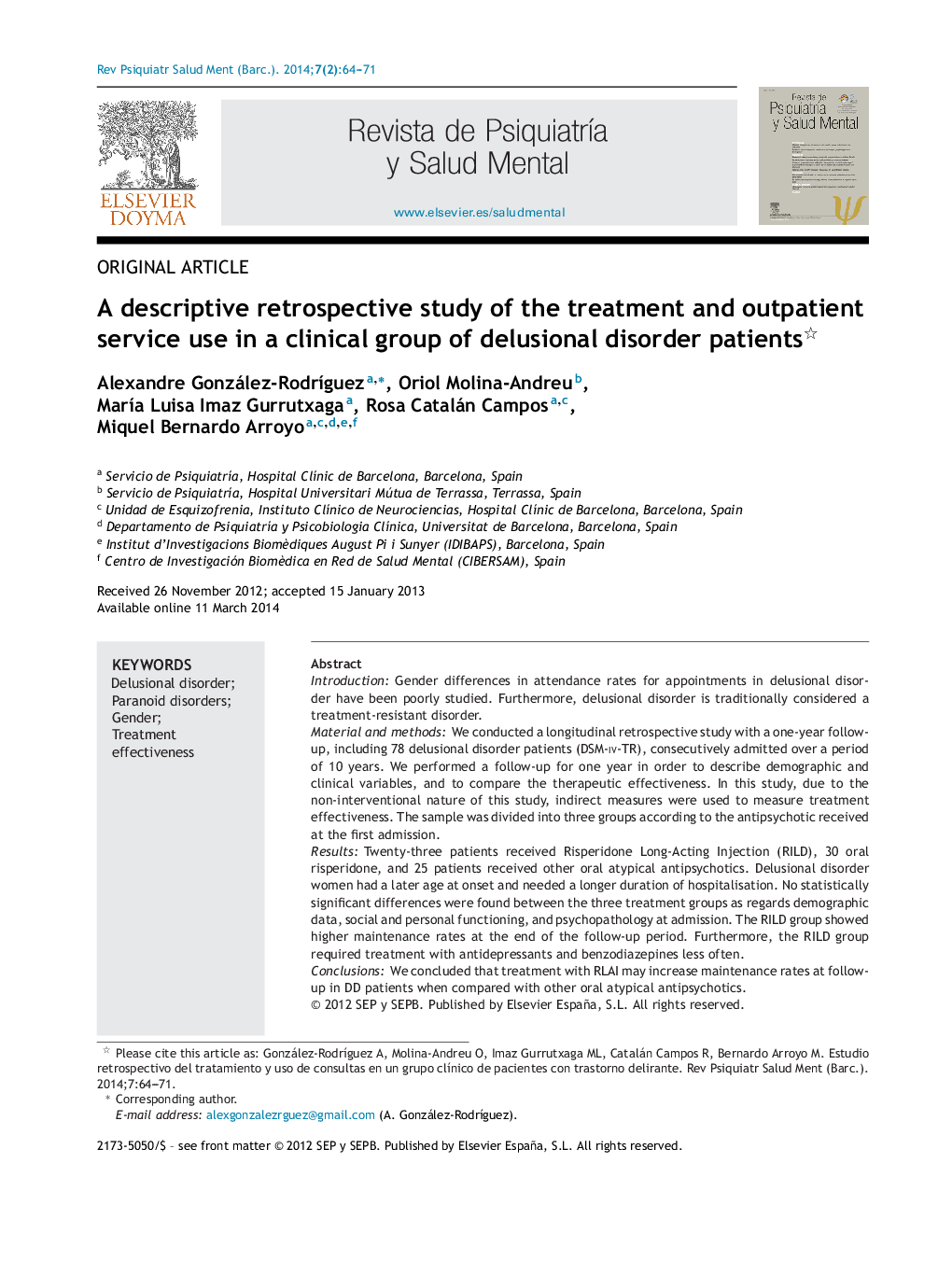| کد مقاله | کد نشریه | سال انتشار | مقاله انگلیسی | نسخه تمام متن |
|---|---|---|---|---|
| 4191518 | 1278287 | 2014 | 8 صفحه PDF | دانلود رایگان |
IntroductionGender differences in attendance rates for appointments in delusional disorder have been poorly studied. Furthermore, delusional disorder is traditionally considered a treatment-resistant disorder.Material and methodsWe conducted a longitudinal retrospective study with a one-year follow-up, including 78 delusional disorder patients (DSM-IV-TR), consecutively admitted over a period of 10 years. We performed a follow-up for one year in order to describe demographic and clinical variables, and to compare the therapeutic effectiveness. In this study, due to the non-interventional nature of this study, indirect measures were used to measure treatment effectiveness. The sample was divided into three groups according to the antipsychotic received at the first admission.ResultsTwenty-three patients received Risperidone Long-Acting Injection (RILD), 30 oral risperidone, and 25 patients received other oral atypical antipsychotics. Delusional disorder women had a later age at onset and needed a longer duration of hospitalisation. No statistically significant differences were found between the three treatment groups as regards demographic data, social and personal functioning, and psychopathology at admission. The RILD group showed higher maintenance rates at the end of the follow-up period. Furthermore, the RILD group required treatment with antidepressants and benzodiazepines less often.ConclusionsWe concluded that treatment with RLAI may increase maintenance rates at follow-up in DD patients when compared with other oral atypical antipsychotics.
ResumenIntroducciónLas diferencias de género en la asistencia a consultas por trastorno delirante han sido escasamente estudiadas. Además, el trastorno delirante es tradicionalmente considerado como un trastorno resistente al tratamiento.Material y métodosSe llevó a cabo un estudio retrospectivo longitudinal que incluyó 78 pacientes con trastorno delirante (DSM-IV-TR) que ingresaron consecutivamente en nuestro centro en un período de 10 años. Se realizó un seguimiento de los pacientes durante un año con el objetivo de describir variables demográficas y clínicas y comparar la efectividad terapéutica. En este estudio, debido a su naturaleza no intervencionista, se realizó un análisis de las medidas de efectividad indirecta. La muestra se dividió en 3 grupos según el tratamiento antipsicótico recibido en el primer ingreso.ResultadosVeintitrés pacientes recibieron risperidona inyectable de acción prolongada (RILD), 30 risperidona oral y 25 otros antipsicóticos atípicos orales. Las mujeres con trastorno delirante presentaron un inicio más tardío del trastorno y requirieron un mayor tiempo de hospitalización. No se encontraron diferencias estadísticamente significativas entre los 3 grupos de tratamiento con respecto a los datos demográficos, al funcionamiento social y personal, así como a la psicopatología en el ingreso. En el seguimiento durante un año el grupo RILD mostró un mayor porcentaje de permanencia al final del período evaluado. Además, el grupo RILD requirió con menor frecuencia un tratamiento con antidepresivos y benzodiazepinas.ConclusionesConcluimos que el tratamiento con RILD podría disminuir las pérdidas en el seguimiento del trastorno delirante en comparación con otros antipsicóticos atípicos.
Journal: Revista de Psiquiatría y Salud Mental (English Edition) - Volume 7, Issue 2, April–June 2014, Pages 64–71
